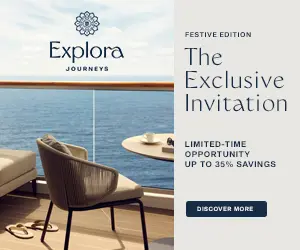Study: Millennials Eschew Luxury Brands
by Maria LenhartWhile baby boomers or gen x’ers are likely to prize a Rolex watch or a vacation at an exclusive luxury resort, millennials could care less about either.
So says Pam Danziger, president of Unity Marketing, which focuses on affluent consumers behaviors. The company’s recent study, Millennials on the Road to Affluence, which surveyed and conducted focus groups among high earners between the ages of 24 and 34, found that traditional status symbols and luxury brands have surprisingly little appeal to younger consumers.
Travel Market Report spoke with Danziger about the study and what implications it holds for travel agents seeking to serve the emerging millennial market.
In what key way do millennials’ attitudes toward luxury brands differs from that of previous generations?
Danziger: The main thing we found is that millennials don’t want their grandfathers’ or fathers’ luxury brands. They want to embrace their own. They look at traditional luxury as elitist, snobbish and exclusive. They want something more personal, democratic and inclusive.
When we use the word luxury, it doesn’t resonate with them. They view it with suspicion. They told us in discussion groups that the word ‘luxury’ is a marketers’ word – it’s used to boost the price. It doesn’t mean anything to them and it turns them off.
What does this mean for people—like travel agents—to sell and market their services to millennials?
Danziger: The main takeaway is that you really don’t want to use the luxury label with them. If you are trying to sell to millennials, you need to qualify and quantify what you mean by luxury. How it relates to what is important to them.
You need to tell them new stories. What resonates with baby boomers – and luxury is very meaningful to them – doesn’t with millennials. The gated resort may not be what they’re looking for. Getting off the beaten track and rubbing shoulders with the locals may be more important.
Does that mean that high-end travel does not appeal to millennials?
Danziger: Not at all. One of my clients who has success in the millennial market is an adventure travel company in Western Canada. You stay in a lodge and take a helicopter to a mountain for a pristine skiing experience.
The vacation is not luxurious in the traditional sense, but it it’s the ultimate luxury for someone who is passionate skiing. And it’s very expensive – more so than going to Park City and staying at resort with a famous luxury brand name.
What seems to be driving the suspicious attitude that millennials have toward luxury brands?
Danziger: Millennials have been marketed to since they were babies, so they are very savvy. Thanks to the internet, they know so much more. Today the consumer researches everything and talks to people. The wealth of information has leveled the playing field. That’s why you have to do so much research to stay ahead of the game.
Millennials are better educated than previous generations and they are very aware consumers. Luxury branding is the ultimate in smoke and mirrors – millennials know this.
But if consumers, particularly millennials, already know so much, how can travel agents convince them they need to consult a professional?
Danziger: When I speak to groups of travel agents, I always urge them to not try and sell everything to everybody. Be an expert.
When it comes to millennials, who tend to be well-traveled already, travel agents need to provide new kinds of experiences that you can’t easily find elsewhere. So you have to distinguish yourself in a new and different way.
It’s about selling your value. millennials are very value-oriented. So it’s a matter of talking to the customer and learning where their value proposition lies.
If you have information that Fodor’s or Trip Advisor doesn’t have, insider information on things that are unique and different, they will see the value in working with you.
Why is it so important for travel agents to learn to appeal to the millennial generation?
Danziger: Millennials are the next huge generation coming up. They are as big as the baby boomers. They are ages 15 to 35, so they haven’t yet reached their peak earning years.
However, they will get there soon. It’s important to capture them now because their potential impact is so enormous.
Of course, you don’t want to disregard the baby boomers. Their preferred type of luxury is still a huge area – and they have the time and money to travel.
What else did you learn about millennials in your study? Is travel important to them?
Danziger: We asked young people to give a montage of what they define as their American dream. These aspirations did not include big fancy houses.
But everyone did seem to want travel or vacation experiences. They were looking for a lifestyle that allows them to have a personal life – experiences more than things are important to them.
























